Salivary testing tells us if a patient has harmful bacteria in their gums. Bacteria can travel in saliva to the gut and cause inflammation. Inflammation can damage the gut lining and let more bacteria into the body. Inflamed gums can also let bacteria into the bloodstream, causing more inflammation. These harmful bacteria are linked to many chronic diseases. Our goal is to remove these bacteria to improve overall health.
Ozone is a non-toxic, naturally occurring element that has powerful antimicrobial properties. Ozone can break down the bacteria that lives around the teeth and in the pockets which causes harmful bacteria and viruses to die. This makes ozone a very effective tool for treating periodontal disease, infected tooth roots and other dental issues. It is also a very safe and effective “pre-treatment” for fillings and sealants.
Do you experience bad breath, build-up around your teeth, or gums bleeding despite your regular oral hygiene routine? This may be related to your gut health. Some people experience mild to severe gut symptoms like stomachaches, bloating, and constipation when their gut health is compromised. A simple test can tell us if your gut is is out of balance. The D3 hormone, also known as Vitamin D3 is a contributor to our gut health. The optimal range for adults or children is typically 60-80 ng/ml. Anything above or below this range can cause symptoms that have a huge impact on your overall health. Vitamin D3 is absorbed from the sun by our skin and transported to the gut where it works with four bacterial species to create eight growth factors known as the B vitamins. The gut thrives when these vitamins work together in the correct amounts. Vitamin D3 and the B vitamins work together to reset the gut biome, which directly affects the oral microbiome. There is a specific protocol for accomplishing this, which includes taking vitamins, retesting levels, and monitoring improvements in blood levels, sleep, energy, pain, and mood to determine the proper individualized dose that keeps you in the optimal health range.


